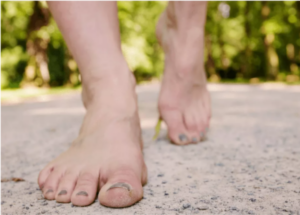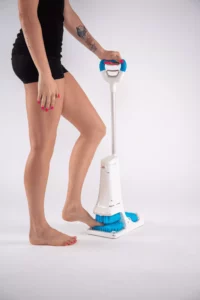Foot odor, a common concern among many, can be an embarrassing issue that affects one’s self-esteem and social interactions. Perhaps you’ve tried everything to eliminate it, but to no avail. But have you ever considered foot scrubbers? This article aims to investigate the question, “Can foot scrubbers aid in the removal of foot odor?”
Our first section will delve into the root of the problem, discussing the causes and mechanisms of foot odor. We’ll explore the science behind why our feet sometimes emit unpleasant odors, providing a thorough understanding of the issue at hand. Following this, the role of foot hygiene in controlling foot odor will be discussed. This will help emphasize the importance of maintaining proper foot hygiene and how it can help alleviate this common problem.
In the third section, we’ll provide insights into the functionality of foot scrubbers. This will include an explanation of how foot scrubbers work and how they can be used effectively. The fourth section will then assess the impact of foot scrubbers on foot odor reduction. We’ll provide evidence-based information to address whether foot scrubbers are truly effective in combating foot odor.
Finally, the last section will present a comparison of foot scrubbers with other foot odor removal methods. This comparison will help readers make an informed choice about the most suitable method for their specific needs. By the end of this article, you will have a comprehensive understanding of foot odor, foot hygiene, and how foot scrubbers might be the solution you’ve been seeking.
Causes and Mechanisms of Foot Odor
Foot odor, also known as Bromodosis, is a common condition that can affect anyone, regardless of age or gender. It is caused due to the breakdown of sweat by bacteria that reside on the skin of the feet. These bacteria thrive in warm, moist environments and hence, tend to multiply rapidly in the presence of sweat, leading to the production of a foul smell.
There are numerous factors that can contribute to foot odor. For instance, hormonal changes, especially during puberty or pregnancy, can lead to increased sweat production, thereby enhancing the likelihood of foot odor. Furthermore, certain medical conditions such as hyperhidrosis (excessive sweating) or athlete’s foot can also result in foot odor.
Footwear and socks made from synthetic materials may also promote foot odor as they trap sweat and create an ideal environment for bacterial growth. Poor foot hygiene, such as not washing feet regularly or thoroughly, can also exacerbate the condition.
While foot odor is often seen as a source of embarrassment, it is important to understand that it is a common and treatable condition. A crucial step in controlling and preventing foot odor involves understanding its causes and mechanisms, which paves the way for effective treatment and prevention strategies.
Role of Foot Hygiene in Controlling Foot Odor
Foot hygiene plays a crucial role in controlling foot odor. It is an important subtopic in understanding whether foot scrubbers can aid in the removal of foot odor. This is because foot odor is primarily caused by bacteria that thrive in the moist and warm environment of the foot. These bacteria break down sweat and dead skin cells, producing an unpleasant odor in the process.
The role of foot hygiene, therefore, is to create an environment that is unfavorable for these bacteria. This can be achieved through regular cleaning and drying of the feet, and by removing the dead skin cells that provide food for the bacteria. Scrubbing the feet, in this case, helps to exfoliate the skin, leaving the feet cleaner and reducing the amount of sweat and dead skin cells.
Foot hygiene is also about maintaining a healthy balance of skin flora. While some bacteria are responsible for foot odor, others are beneficial and help to protect the skin. Good foot hygiene practices, therefore, should not completely remove all bacteria from the skin but should aim to reduce the number of odor-causing bacteria. This can be achieved through the use of foot scrubbers and other foot hygiene products that contain antibacterial ingredients.
To sum up, good foot hygiene, which includes regular foot scrubbing, can help to control foot odor by reducing the number of odor-causing bacteria, removing the sweat and dead skin cells they feed on, and maintaining a healthy balance of skin flora.
Understanding the Functionality of Foot Scrubbers
Foot scrubbers have a vital role in maintaining foot hygiene, which is directly linked to the control of foot odor. The primary function of foot scrubbers is to exfoliate the dead skin cells from your feet. This process is critical because these dead skin cells can accumulate over time, fostering a moist and warm environment that is conducive for the growth of odor-causing bacteria and fungi.
Foot scrubbers come in different varieties, including pumice stones, foot files, and electronic scrubbers. What they all have in common, though, is their ability to scrub off the outermost layer of dead skin, uncovering the fresh and healthy layer underneath. This process can help to reduce the possibility of bacterial and fungal growth, which are the leading causes of foot odor.
Moreover, foot scrubbers stimulate blood circulation in the feet. Improved blood circulation can contribute to healthier skin and faster cell renewal, both of which can further help in reducing foot odor. Regularly scrubbing your feet can also help in preventing conditions like athlete’s foot, which can cause unpleasant foot odor.
In conclusion, foot scrubbers can indeed aid in the removal of foot odor. They do so by exfoliating dead skin cells, stimulating blood circulation, and promoting healthier skin. However, they should be used as part of a comprehensive foot hygiene routine for the best results.
Impact of Foot Scrubbers on Foot Odor Reduction
The Impact of Foot Scrubbers on Foot Odor Reduction is an essential subtopic to understand when discussing the problem of foot odor. Foot scrubbers play a significant role in maintaining foot hygiene, which is a crucial factor in controlling foot odor. They aid in the removal of dead skin cells, dirt, and bacteria, which can be instrumental in reducing foot odor.
Foot odor is primarily caused by sweat and bacteria. The foot has more sweat glands per inch than any other part of the body, and when the sweat interacts with bacteria on the skin, it results in an unpleasant odor. Foot scrubbers, in this regard, can help in reducing the number of bacteria on the foot, hence, aiding in odor reduction.
Foot scrubbers come in different types, but most of them have a coarse surface that scrubs off the dead skin cells and dirt from the foot. This process also improves blood circulation in the feet, which helps to reduce sweating and, therefore, the odor. Moreover, they can reach areas that are typically hard to clean, such as in-between the toes, where bacteria often thrive.
In conclusion, foot scrubbers can indeed aid in the removal of foot odor. They not only help in maintaining cleanliness but also promote healthier skin on the feet. However, they should be used as part of a broader foot hygiene routine, which should include washing the feet regularly, drying them thoroughly, and wearing breathable footwear.
Comparison of Foot Scrubbers with Other Foot Odor Removal Methods
Foot scrubbers are a valuable tool in the fight against foot odor, but they are not the only method available. To fully understand their efficacy, it’s important to compare them to other foot odor removal methods. These alternatives commonly include creams, sprays, powders, socks, and insoles, each with their own merits and demerits.
Foot scrubbers work by physically exfoliating the skin and removing the dead skin cells that can harbor bacteria, which is a primary cause of foot odor. They can also stimulate blood flow, contributing to healthier skin that is less prone to odor. However, their effectiveness is often dependent on regular use and they may not fully address the issue if the cause of the odor is a deeply ingrained bacterial or fungal infection.
On the other hand, creams and sprays can be more convenient to use, and they often contain antibacterial and antifungal ingredients that directly target the organisms causing the odor. However, they may not address the buildup of dead skin cells, and some people may find them too messy or uncomfortable to use regularly. Powders can be effective at absorbing moisture, another common cause of foot odor, but they can also be messy and may not be suitable for use with all types of footwear.
Socks and insoles designed to combat foot odor often incorporate antibacterial materials or deodorizing compounds. They can be particularly effective for people whose foot odor is exacerbated by excessive sweating. However, they need to be replaced regularly and can be more expensive than other options in the long run.
In conclusion, while foot scrubbers can be a highly effective method for controlling foot odor, their efficacy can be enhanced when used in conjunction with other methods. The choice between these methods often depends on the specific causes of the foot odor, personal preference, and lifestyle factors.




